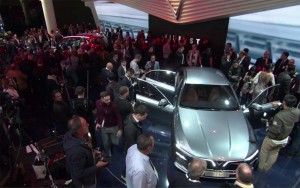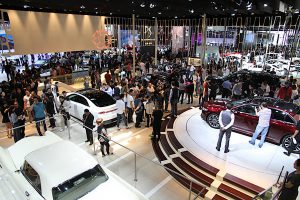In what many will consider a bright spot, organizers of the Beijing International Automotive Exhibition revealed they are postponing the event to late September and early October.
The show was supposed to be held later this month, but will now take place Sept. 26-Oct. 5. The show is the first to be postponed and come up with alternate dates. Last week, the Paris Motor Show, which is held in October, was cancelled, although some of the charity events may still occur.
The last major auto show held was the Los Angeles Auto Show last November. Since then, the coronavirus pandemic has wiped out every salon to be held since then, save the New York International Auto Show, which has been postponed, to the end of August.
(Paris Motor Show latest to cancel due to coronavirus pandemic.)

The 2020 Paris Motor Show, which was set to occur in October, has been cancelled due to coronavirus concerns.
The first major show to be affected was the Geneva Motor Show in February. Automakers scrambled to hold a variety of events via the internet, although one automaker – Koenigsegg – did host its event from the show floor, surrounded by the boxes of equipment being packed up and shipped out.
After that, the events have fallen one by one, Chicago, New York, Detroit and Paris. Auto shows have been declining in recent years.
In fact, the Detroit show used to be held in early January but moved to June in hopes of playing on the slew of auto-related events occurring in the area at that time and attracting more automakers to participate in the show.
(2020 Detroit Auto Show cancelled due to coronavirus pandemic.)
Another show, the Frankfurt Motor Show, has been permanently closed by the event’s organizers. The biennial event typically filled the massive Frankfurt Messe – and then some – but the flight of automakers from auto shows to other types of marketing events and efforts ultimately claimed what was once considered by many the most prominent show in the world.

Organizers of the Detroit Auto Show moved it from January to June, but had to cancel it due to the pandemic.
The Verband der Automobilindustrie, the organizing body, thanked the City of Frankfurt for “this long, very good and trusting partnership.”
Considering Germany’s role in the auto industry, the VDA says it is looking at “very creative” ideas offered up by other cities, including Berlin, Hamburg and Munich. But, considering the way things are going for auto shows, few would be surprised if 2019 marks the country’s last major event.
(End of the road for Frankfurt Motor Show – and That’s Bad News for Other Auto Shows.)
Some experts believe that in today’s digital world, more interactivity will be critical to saving the car show. Detroit could provide a signal of how such events might take shape. But with few of the brands that skipped out in 2019 set to come back, it’s far from certain the new approach will gain traction. And, as with the cancellation of the Frankfurt event, that would be bad news for auto shows everywhere.


There was a 2020 Chicago auto show this year. It’s the largest in the U.S. and generates more new vehicle buyer leads than any other show.